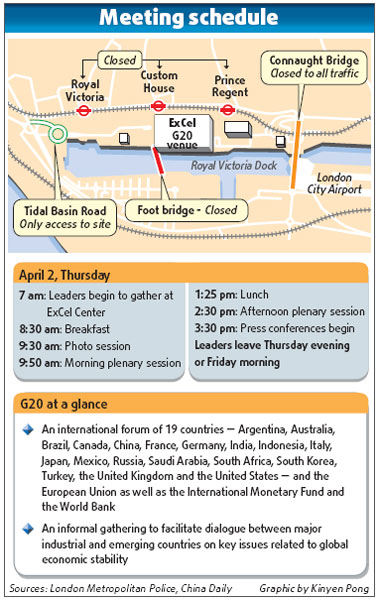Clouds, chilly winds and widespread cynicism about the world leaders' ability to overcome hardships embrace the Group of 20 (G20) Summit which opens in London today.
A cab driver, dropping off passengers a stone's throw from ExCel, the venue of the summit, said: "I seriously doubt they can do any good, even though I hope they can."
Inside century-old buildings, which house the city's top financial institutions, government offices and universities, there is tremendous anxiety about the results the historical event can bring about.
The G20 Summit is widely regarded as the "first ever serious effort by various nations to overcome the global crisis, despite political and cultural differences".
Analysts, government officials, columnists and academics aren't hesitating to admit "it's make or break time" for the world.
No matter certain reservations, the G20 is the only major multilateral mechanism (it is still not an institution yet as it doesn't have an office) created to reflect the realities of the world, post World War II.
Compared with the UN Security Council, the World Bank and the International Monetary Fund, the G20 has much wider participation, with 11 out of 20 members belonging to emerging market economies outside North America and Western Europe (industrialized economies also include Japan and Australia).
The most important common feature is not that the participating nations are large economies, and when combined, represent 85 percent of the world's economy.
Rather, it is that they have all been beneficiaries of an expanded global market.
It is in their interest to prevent globalization from falling apart amid the financial crisis.
If the G20 can work, to yield at least some shared principles, if not joint efforts and common standards, it can set an example for global-level collaboration among nation states in other areas.
There will be many collaborative projects, as one can easily tell, waiting for initiatives similar to the London summit in the next few years, ranging from climate change to disease control and food and medicine standards.
Climate change alone may call for global efforts in many sub-areas.
But if the G20 fails, what can the world expect from future cooperative programs?
People still remember the dark days. It is not just the Great Depression, nor just the catastrophic London Monetary and Economic Conference in 1933, which the United States pulled out of at the last minute, but more importantly what happened afterwards - the lost chance to rescue the world's economy and the so-called Great Depression Part II, which led all the way to the outbreak of World War II.
Fortunately, the chance of an immediate war is slim nowadays. But a prolonged crisis, followed by an even longer period of weak recovery, as some economists have feared, can lead to many misfortunes.
Worst of all, if nothing is done, and if political leaders are hijacked by economic realities, people would see many fragmented pursuits of unilateral interests, from protectionism to other reckless forms of nationalism.
What can be actually done to make the G20 work? The leaders would have to make the right choices, and implement them in smart ways.
The chairing country, changing on an annual basis, can do a lot of things to make sure that each year certain new agreements can be achieved.
This year, the British government has made painstaking efforts in trying to broker a deal during difficult times.
Bilateral relations and regional relations, if managed carefully, can also serve as a double insurance for key initiatives taken by a successful G20.
At the same time, unilateral examples can have constructive significance, too.
At Oxford University and London School of Economics, there are academics praising the People's Bank of China Governor Zhou Xiaochuan's article on the world's currency reform as a sign of China's "seriousness in contributing ideas", regardless of when those ideas are tabled for discussion.
In the long run, contributing constructive ideas will be valued as much as stimulus funds. China has already shown the world that it is willing to do both.

(China Daily April 2, 2009)